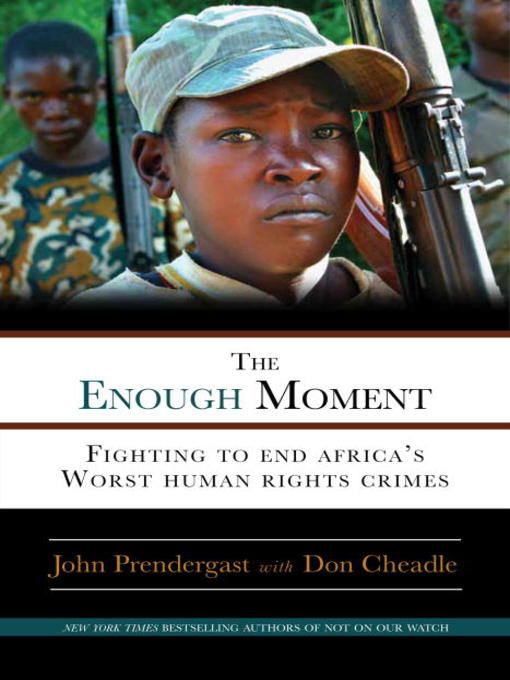
The Enough Moment
Fighting to End Africa's Worst Human Rights Crimes
کتاب های مرتبط
- اطلاعات
- نقد و بررسی
- دیدگاه کاربران
نقد و بررسی

July 12, 2010
Prendergast, cofounder of the Enough Project, an initiative to end genocide, and Academy Award–nominated actor Cheadle follow their bestselling Not on Our Watch (2007) with an another ambitious appeal to eradicate Africa's most deadly social problems: mass rape, genocide, and the conscription of children. Taking a positive angle, the authors contend that the genocide in Darfur, the employment of rape as a war weapon in Congo, and the use of child soldiers in Uganda is fostering a groundswell of organized resistance and activism that can "bring these nightmares to an end." Despite its unimpeachable aims, the book's execution is shoddy. An extended (and oddly stilted) dialogue between Prendergast and Cheadle serves as a fragile "narrative spine" to connect a farrago of history, commentary, and personal testimonials from survivors, activists, and a glut of celebrities, among them Mia Farrow, Ben Affleck, and Angelina Jolie. Prendergast and Cheadle conclude with an appeal for a "people's movement" to press governments to implement a strategy of "promoting peace, providing civilian protection, and ensuring punishment of the perpetrators"—the 3Ps—that they argue will end these crimes against humanity.

June 1, 2010
In follow-up to their bestseller Not on Our Watch: The Mission to End Genocide in Darfur and Beyond (2007), Prendergast, a human-rights activist and co-founder of the Enough Project, and actor Cheadle urge ordinary citizens to take action against genocide, the recruitment of child soldiers and the use of rape as a war weapon in African nations.
Hoping to galvanize readers, the authors trace the history of these "heinous and despicable" war tactics, which have resulted in some 10 million deaths in the last 20 years in east and central Africa, and tell the stories of U.S. and African activists who have worked to foster the political will and policies needed to put an end to these abuses. The authors demonstrate how individuals can reach the point where they feel "enough is enough" when it comes to human-rights outrages, and actually do something as a result. Examples include: An Ohio minister, moved by a newspaper story, got church members to participate in rallies and petition drives to help survivors of war in Darfur; students visiting Uganda witnessed an attack involving child soldiers of the Lord's Resistance Army and created a group that involves hundreds of thousands of young people in efforts to end the child militia. An award-winning filmmaker met rape victims in the war-torn Congo, wondered why the world isn't "tearing its hair out at the horror of this" and made the widely viewed film The Greatest Silence (2007), which sparked global action. Focusing on genocide in Darfur, child-soldier recruitment in Uganda and sexual violence in the Congo, Prendergast and Cheadle chronicle actions by diverse individuals, including survivors, teachers and journalists, as well as such celebrities as Sheryl Crow and Angelina Jolie. Noting that the Obama Administration's strong stand against human-rights crimes makes this an opportune moment for activists to press for action, the authors suggest a comprehensive strategy for ending each wartime abuse. They list more than a dozen ways in which people can take a stand, from calling government officials to organizing teach-ins.
Sometimes overblown and repetitive, but an important, valuable toolkit that will inspire many.
(COPYRIGHT (2010) KIRKUS REVIEWS/NIELSEN BUSINESS MEDIA, INC. ALL RIGHTS RESERVED.)

























دیدگاه کاربران